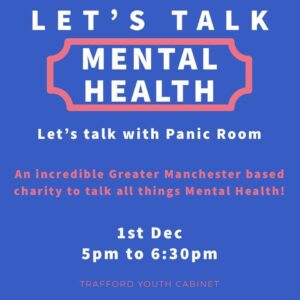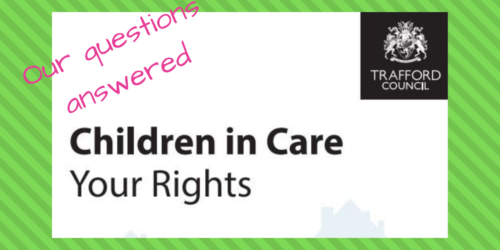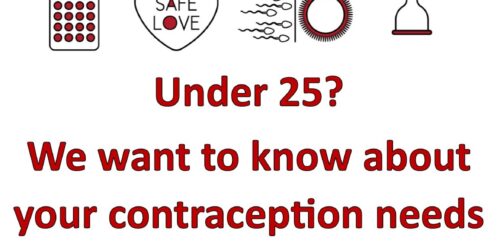What is anxiety and how can you help someone who experiences it? Report from the Trafford youth conference
Youthwatch Trafford’s Luis attended the 2020 Let’s Talk Youth conference in December – this is his report on the session from 1st December, ‘Let’s Talk Mental Health with The Panic Room’

Together with Trafford Youth Cabinet, Joshua Fletcher from the Panic Room gave a talk on anxiety and how you can help someone who struggles with it.
Josh is a psychotherapist who was previously diagnosed with generalised anxiety disorder, among some similar diagnoses. After a lot of learning and hard work he has been able to overcome his excessive anxiety and been able to write two books on the subject and study it in depth. Mental health problems are more common than you’d think, with one in six people reporting they experience a common mental health problem in any given week in England. Everyone will experience anxiety at some point in their life, but it can be worse for some than others.
What is anxiety?
Josh tells us that anxiety can come in many forms of ‘upset’, but one way to look at it is to order it in three components: feelings, thought and sensations. For example, some people can have feelings of dread, or impending doom. They can have constant thoughts of worry, for example if someone’s heart started beating quickly they might think “what if I’m having a heart attack?” This can lead onto the sensations, where for example they could start to sweat or feel nauseous amongst other things.
So, how can you help people with anxiety?
To Josh, one of the most important things we can do is to create a culture of acceptance of both anxiety and other problems – it’s important that people know you’re there for them, that you want to listen to what they have to say, and that you understand it’s a problem for them – if you simply dismiss people’s worries as being “dramatic” then it’s most likely that they won’t open up to you. People might not talk about their problems if you try to pressure them to say what’s wrong, so if you let them know they can talk to you about their problems then they’ll open up more. Making small comments around these areas, for example talking about anxiety, can help people know it’s more acceptable to talk about.
How you can help someone having a panic attack
People with anxiety can sometimes have panic attacks, too. Josh tells us that often, trying to help yourself or someone else having a panic attack can be a bit tricky, as it can cause them to get stressed and that rushing to do something to stop having the panic attack can just makes it worse. Instead, he says to do the opposite – don’t do anything. Techniques on how to get out of a panic attack can be useful, but can also lead to a false sense of security. If it suddenly doesn’t work one time, then it’ll make you even more stressed.
Josh says the best thing to do if you see someone having a panic attack, is to try and “ground” them. Start off by asking them 5 things they can see, hear or feel. Then, you could ask for another 4 things they can see, hear or feel and carry on like that until the panic attack passes. You could also show some understanding of what’s happening, saying what they might be feeling, and tell them that they will be fine. It’s important that they understand that it’s not going to kill them, and that it will pass.
Finally, Josh talked about the usefulness of therapy. No one’s beyond help – he gave an example of someone who had struggled with 40 years of aggrophobia, the fear of being in situations where escape might not be available or would be difficult, and yet over time Josh has been able to help him overcome his fears in order to better cope with it in his daily life. Therapy can help people to overcome anxieties and burdens which seem insurmountable, or that “don’t matter”.
Remember to check out our mental health page for more information, guidance and sources of help!
Thanks to Trafford Youth Cabinet for running the conference and to Josh from Panic Room for the talk!






